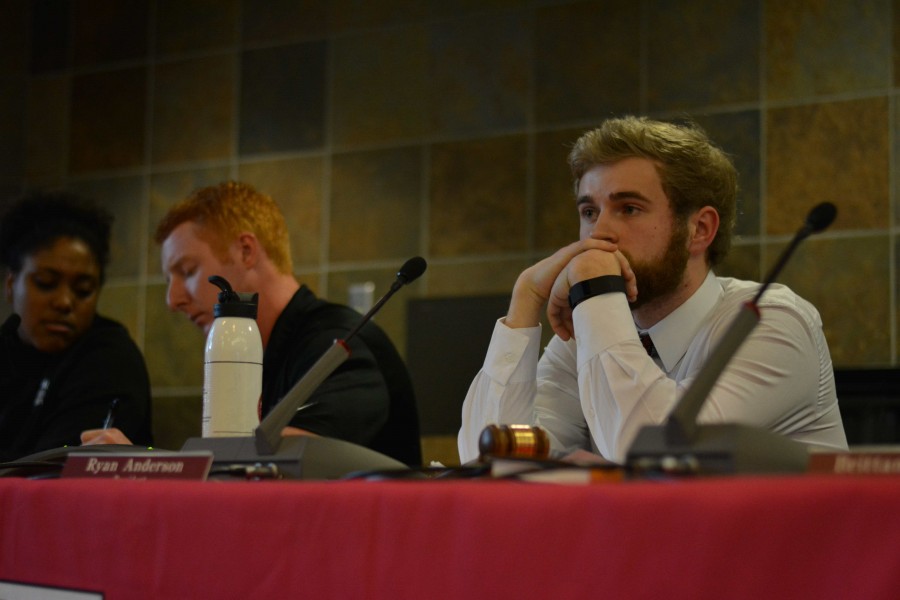ASCWU President Ryan Anderson asked to resign prior to Monday’s meeting, board moves ahead with vote of no confidence
Anderson refused saying it should be up to the students to decide
February 22, 2016
Updated Monday, Feb. 22 at 10 p.m.
ASCWU officers expressed their discontent with President Ryan Anderson’s leadership capabilities by moving forward with a vote of no confidence in his ability to lead student government.
The meeting took place in front of about 75 students, which was one of the highest attended meetings of the year so far, student government officers later said.
During the latter half of the meeting, student government read out loud two letters previously sent to Anderson outlining their concerns. The letters contained changes they hoped the board could agree on.
After the vote, students provided feedback on the decision to call for Anderson’s resignation. Many students said they wanted to hear definitive examples of Anderson’s alleged shortcomings.
“In the letters that were read, I heard a lot of reasons why they don’t want Ryan to be president anymore, I didn’t hear a lot of facts,” said Grace, a CWU student. “I’m sure there are but I would encourage all of you, if this is to come to a recall vote, to ask for that to be made public so we can all make a better decision on that.”
Nina Caldwell told the students the ASCWU can and will release the documents to the public on the issues with Anderson.
“We’re here for you,” Caldwell said. “We’re here for students.”
About 20 people talked during the public comment portion of the meeting. A majority of the students were not in favor of recalling Anderson.
Rene Mahnke said in an interview after the meeting that they did not want to give definitive examples because they did not want to tarnish Anderson’s reputation or go back and forth in a public argument.
More information will be posted in our print issue on Wednesday, Feb. 24 and online.
Original story:
The Associated Students of Central Washington University (ASCWU) Student Government will be publicly asking ASCWU President Ryan Anderson to resign today.
Anderson confirmed this during a phone interview.
The meeting is scheduled to take place at 5 p.m. in the SURC Pit.
Multiple sources have confirmed ongoing issues between ASCWU board members and Anderson, dating back to November. These issues were outlined in several letters between Anderson and the board, which were provided to the Observer by Anderson.
“All members of the board must be willing to make sacrifices… our President has failed to make those sacrifices,” one letter reads.
In a letter sent on Nov. 10, 2015, the ASCWU cited complaints about Anderson’s lack of communication to the other members. They also wrote that Anderson placed outside obligations and priorities above those of the ASCWU.
“[Personal matters seem] to be of more importance to him, to protect his own interests, rather than advocate for the needs of students,” wrote ASCWU board members.
Anderson addressed their claims in another letter written on Nov. 16.
“This needs to be a process—based on accountability and mutual respect—that moves the Student Government forward in its agenda,” Anderson wrote.
After the letter exchange, the ASCWU met with Linda Waters, a professional mediator with Ellensburg’s Dispute Options, during fall quarter, multiple sources said.
Anderson wrote in the Nov. 16 letter that he was “looking forward to [their] discussions,” but the result of that mediation was ultimately unsuccessful.
In another letter dated Feb. 1, 2016, the ASCWU claimed that Anderson had “been blatantly disrespectful to not only the ASCWU Student Government staff, but also his advisors and the administration of Central.”
In that same letter, the ASCWU said Anderson’s leadership was “extremely toxic to a positive command climate [created solely by the President].”
When called to comment on specifics of these accusations, one board member on behalf the ASCWU declined, citing it as a personnel issue. They said they preferred to continue the discourse during today’s meeting.
Anderson followed up with another letter on Feb. 22 to address and rebuke the claims made by other ASCWU members. In it, Anderson argues that the “two letters are contradictory in their structures.”
“The first takes a stance that I was not committed or involved with Student Government and the second states that I am too heavily involved with the ongoings of ASCWU,” Anderson wrote.
He claimed that the ASCWU does not have any concrete examples or evidence of their complaints.
“From my perspective on this whole situation, they have all these accusations towards things I’ve done wrong, but they have no specific evidence, or examples of anything that is structured in this letter,” Anderson said in a phone interview.
If Anderson does not agree to resign, sources say the board would hold a vote of no confidence in the president, which would publicly declare that he has not, in their opinion, carried out his duties responsibly.
From there, the ASCWU would undergo several steps outlined in Anderson’s letter:
- “ByLaw 6:1.1A the board members or any students interested in recalling the Office of the President must obtain a petition of 1,179 student signatures.
- The Elections Coordinator and Commission must validate said signatures. If valid, the petition is delivered to the Council of Probity.
- ByLaw 5:1.2A there will be a hearing held by the Council of Probity over the dispute presented in the petition.
- ByLaw 5:2.1A/D/E, the Council of Probity will make a decision or set an opinion over the dispute. The verdict will determine what action progresses, as outlined in the ‘Rules of Probity.’
- If actions are considered deplorable by the Council of Probity, the Elections Commission will hold a special election, where majority vote dictates the future of said office (ByLaw 6:1.1D).”
This story will be updated tonight following the ASCWU public meeting.

